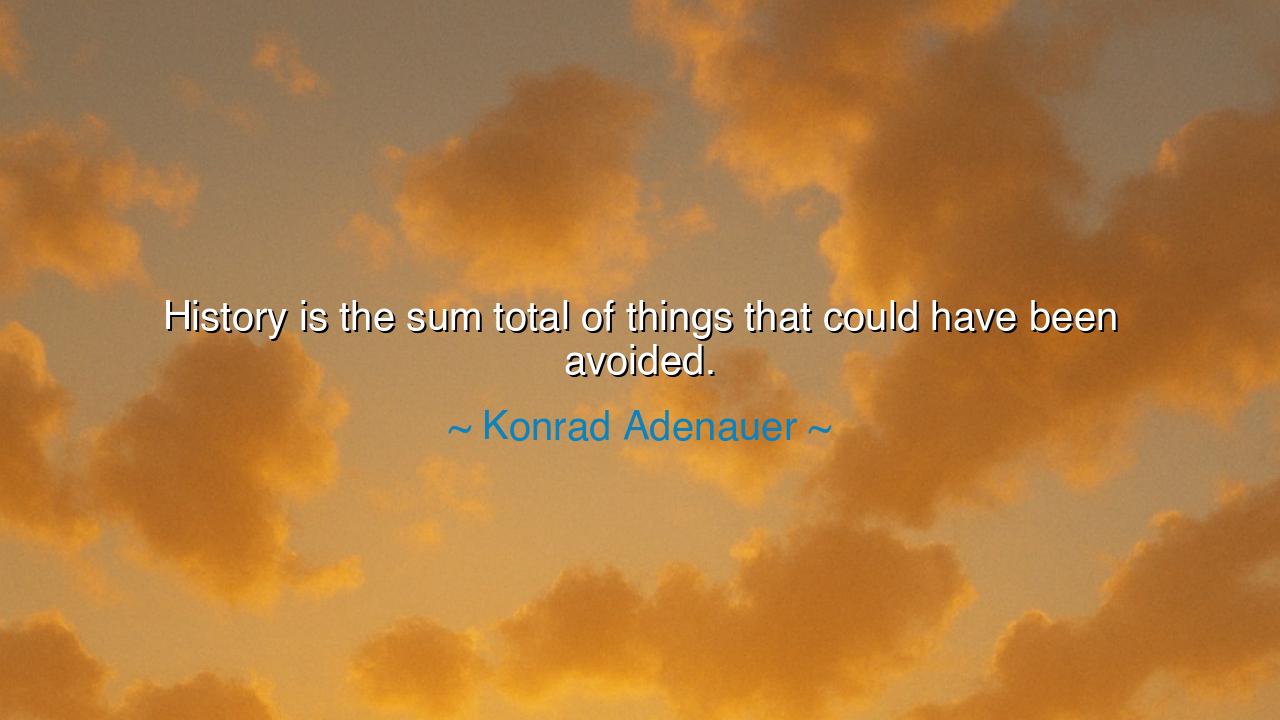
History is the sum total of things that could have been avoided.






The statesman Konrad Adenauer, who guided Germany from the ashes of war into a new dawn, once said: “History is the sum total of things that could have been avoided.” These words, though spoken with the restraint of a politician, carry the sorrow of a man who had witnessed humanity’s greatest follies and its rarest wisdom. Beneath their quiet irony lies a truth as ancient as civilization itself — that much of what we call history is not the march of destiny, but the echo of human error. It is the record of pride mistaken for courage, of fear disguised as caution, of choices made when better ones were possible.
Adenauer lived through the ruin of his homeland — through two wars that devoured the world and left nations crippled by grief. He saw with his own eyes how avoidable mistakes, born of arrogance and blindness, can cascade into catastrophe. When he spoke of history as “the sum total of things that could have been avoided,” he was not condemning the past, but warning the future. For he knew that history, though it appears vast and impersonal, is made of the same frailties that dwell in every human heart: impatience, pride, greed, and the refusal to listen. In his wisdom, he saw that to study history is to behold a mirror of all that might have been prevented, had men acted with foresight and humility.
Look to the story of World War I, that great calamity which reshaped the modern world. It began not from necessity, but from misjudgment — a web of alliances, prideful posturing, and rash decisions. A single spark in Sarajevo set fire to the world, yet that spark might have been extinguished by reason. Millions perished because leaders mistook honor for wisdom, and vengeance for justice. And when the war was over, instead of learning peace, they sowed the seeds of another conflict yet to come. Thus was born the tragedy of the 20th century, layer upon layer of avoidable suffering. Adenauer, who came to power after the Second World War, bore the burden of rebuilding from these preventable ruins.
Yet Adenauer’s reflection is not one of despair — it is, in truth, a call to awareness. For if history is indeed the sum of avoidable errors, then wisdom lies in learning to see them before they are made. Every generation believes itself wiser than the one before it, yet the same patterns return: nations overreaching in power, people divided by hatred, leaders deaf to counsel. The lesson of Adenauer is that knowledge alone does not save us — only humility and courage can. To acknowledge our capacity for error is not weakness, but the beginning of strength.
There is a quiet heroism in this idea. The hero, as the ancients taught, is not the one who charges blindly into fate, but the one who restrains himself when pride tempts him to folly. The greatest victories of mankind are not the wars won, but the wars prevented. The triumphs that endure are not of conquest, but of wisdom — of those moments when men and women chose patience over anger, dialogue over destruction. To see danger and step back from it, to see conflict and heal it before it festers — these are the acts that change the course of history.
Adenauer himself embodied this truth. As Germany’s first Chancellor after the devastation of World War II, he sought not revenge but reconciliation. He rebuilt trust with former enemies, restored democracy, and forged peace through cooperation rather than domination. His leadership was proof that history need not repeat its sorrows — that the mistakes of yesterday can become the lessons of tomorrow. In his humility, he turned the wisdom of his quote into action: to build a future defined not by tragedy, but by learning.
So, my listener, take this truth into your heart: every mistake avoided is a page unwritten in the book of suffering. Every conflict resolved through understanding is a victory greater than any battle won. To live wisely is to remember that the smallest decision — an act of mercy, a word of restraint, a moment of listening — can alter the course of history itself.
Let us then heed Adenauer’s warning and his hope: that history, though born of failure, need not be our fate. If we learn to see what could be avoided before it becomes inevitable, then perhaps our generation will write a different kind of history — one not of sorrow and regret, but of wisdom, restraint, and peace. For the truest triumph of mankind will come not when we conquer the world, but when we learn at last to master ourselves.






AAdministratorAdministrator
Welcome, honored guests. Please leave a comment, we will respond soon